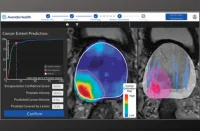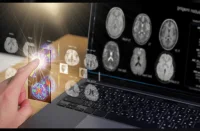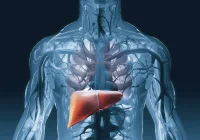While multiparametric magnetic resonance imaging (mpMRI) has become integral in prostate cancer (PCa) diagnosis, there's a debate regarding the inclusion of dynamic contrast-enhanced (DCE) sequences in future PI-RADS iterations due to questionable benefits. To address time constraints, biparametric (bp) protocols, omitting DCE sequences, have gained traction. Recent advancements in image reconstruction using deep learning (DL) networks aim to improve image quality and reduce scan time. The text also discusses the debate surrounding PCa screening, highlighting the limitations of traditional methods like digital rectal examination (DRE) and prostate-specific antigen (PSA) testing. Studies suggest that MRI screening, especially when combined with PSA testing, may improve diagnosis without significant overdiagnosis. The study aims to evaluate the diagnostic performance of an ultra-fast DL accelerated screening protocol compared to a standard multiparametric protocol, suggesting that abbreviated bp protocols could balance the increasing demand for screenings with limited clinical capacity while maintaining diagnostic accuracy and improving patient comfort.
Comparing DL-Accelerated Screening Protocol with Multiparametric MRI for Prostate Cancer Diagnosis
The study, approved by the local ethics committee and complying with the Declaration of Helsinki, aimed to assess the diagnostic performance of an ultra-fast deep learning (DL) accelerated screening protocol compared to a standard multiparametric protocol for diagnosing prostate cancer (PCa). The study included biopsy-naïve patients with clinical suspicion of PCa and excluded those with prior biopsy or treatment, known PCa, incomplete MRI protocol, or severe artifacts. MRI examinations were conducted on a 3-T scanner following PI-RADSv2.1 recommendations. The standard multiparametric MRI protocol included various sequences, while DL-accelerated sequences were used for T2-weighted (T2w) and diffusion-weighted imaging (DWI) prior to contrast agent administration. Image analysis involved lesion annotation and assessment by two radiologists in two reading sessions using a commercially available PACS. The first session evaluated only the abbreviated protocol, assigning PI-RADS scores without dynamic contrast-enhanced (DCE) sequences. Image quality was rated using a Likert scale. In the second session, only the standard protocol was assessed, aiming to compare the abbreviated and multiparametric protocols in lesion detection and PI-RADS scoring.
Study Design for Efficiency and Diagnostic Performance
Eighty-eight patients were enrolled, with 77 patients and 97 lesions included in the final cohort after exclusions. The mean age was 66 years, and the median PSA level was 7.0 ng/mL. The scan time was reduced from 25 min 45 sec to 3 min 28 sec by implementing DL-accelerated sequences, with substantial reductions in time for T2 TSE and DWI. All images were considered diagnostically sufficient in quality. PI-RADSv2.1 scores distribution showed comparable results between the abbreviated and standard protocols. The sensitivity and specificity of the abbreviated protocol were high, with slight variations between readers and PI-RADS cut-off values. Mean image quality was significantly higher for the abbreviated protocol compared to the standard protocol. Inter-reader agreement was moderate for the screening protocol and substantial for the multiparametric protocol, while intra-reader agreement was excellent for one reader and substantial for the other.
DL-accelerated sequences significantly reduced the total scan time
The study compared an ultra-fast deep learning (DL) accelerated screening protocol to a standard multiparametric (mp) protocol currently used in clinical routine. The DL-accelerated protocol, abbreviated from the full mp protocol, consisted of two DL-accelerated sequences. These sequences significantly reduced the total scan time from 25 minutes and 45 seconds to 3 minutes and 28 seconds, representing a reduction of 14%. Specifically, the time for the standard axial T2 turbo spin-echo (TSE) sequence was reduced from 3 minutes and 54 seconds to 1 minute and 26 seconds (a reduction of 37%), and the time for standard diffusion-weighted imaging (DWI) was reduced from 5 minutes and 34 seconds to 2 minutes and 2 seconds (also a reduction of 37%). All included images were assessed as diagnostically sufficient in terms of quality. Both readers rated the image quality of the abbreviated protocol higher compared to the standard protocol. The distribution of PI-RADSv2.1 scores between the two protocols showed comparable results. The abbreviated protocol demonstrated similar diagnostic performance to the standard protocol, with excellent sensitivity and specificity for one reader and high sensitivity and specificity for the other, depending on the PI-RADS cut-off used. Inter-reader agreement was moderate for the screening protocol and substantial for the multiparametric protocol, while intra-reader agreement was excellent for one reader and substantial for the other.
Benefits and Limitations of Abbreviated DL-Accelerated MRI Protocol
The study highlighted the potential benefits of the abbreviated protocol, including enhanced image quality attributed to the DL reconstruction algorithm and reduced acquisition time leading to fewer motion artifacts. The reduced scan time also contributed to increased patient comfort and compliance, particularly beneficial for elderly patients. However, the study noted that abbreviated protocols may not suffice for detailed anatomical evaluation or staging, necessitating further research and refinement in clinical workflows. Additionally, the study emphasized the need for external validation and further investigation into implementation, practicability, and cost-effectiveness.
Overall, the findings suggested that the abbreviated screening protocol, utilizing DL-accelerated sequences, could significantly improve imaging efficacy for PCa screening in clinical practice while maintaining diagnostic performance comparable to the standard protocol.
Source Credit: European Radiology
Image Credit: iStock










